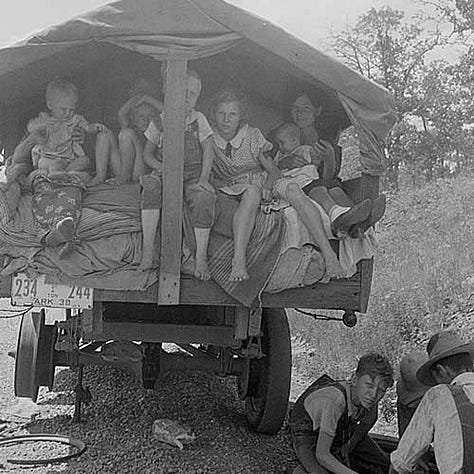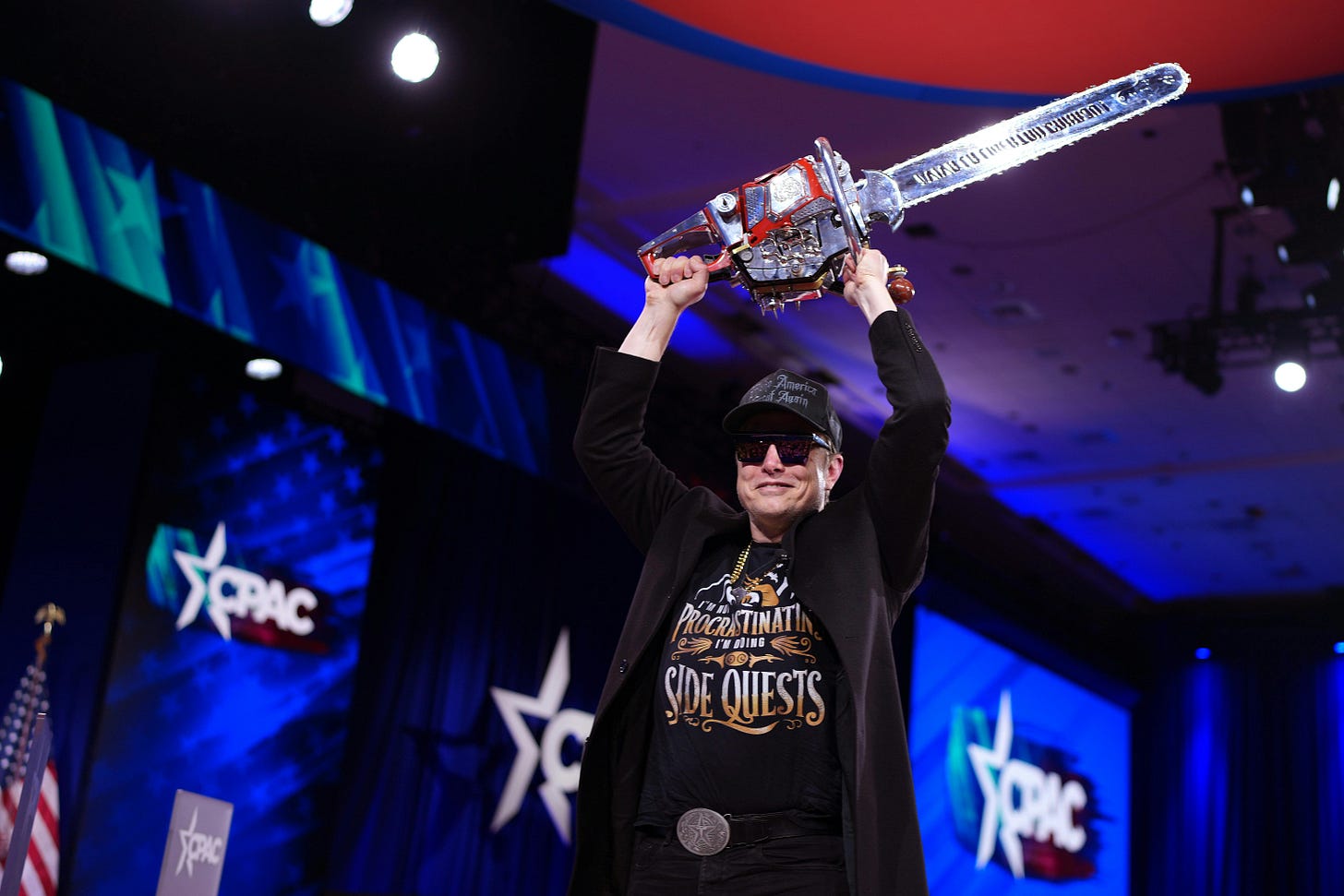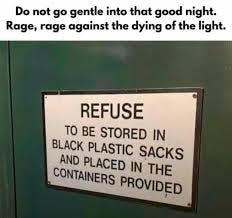Did We Think It Would Go Gentle?
The American empire is collapsing around us. But neither the physics nor the metaphysics suggested that this world order could last. So now what?
In the movie Interstellar, which I hope you’ve all seen, Earth is becoming impossible for humans to live on: toxic and barren. The age of American exceptionalism—indeed human exceptionalism—is over. It’s clear the collapse happened quickly. Farmers are needed, not engineers, because food is needed, not dreams of the future. Rogue foreign drones and AI-directed tractors hover over endless fields of corn—the only crop that’s kept ahead (so far) of a fungal blight that has devoured the rest of the global food supply. In the movie’s intro, real interviews with people who survived the real Dust Bowl set up scenes of coughing families either hunkering down scared or uprooting themselves to run, piled into the beds of trucks from the nineties. The characters are fighting and fleeing a new dust bowl—but there’s nowhere to go.
Sweetie, there’s nowhere to go.



Lately my almost-three-year-old has been really interested in the lunar landing. He’s always been a fan of “my moon friend,” as he calls her, and she’s been beautiful these last few nights, sailing in and out of the clouds like a linocut. Why wouldn’t you want to visit? We got a book about the Apollo missions from the library and my son loves it. He got upset the other day when I wanted to read him a book about trees instead. I didn’t feel like reading about Cold War techno-posturing, even though I do think it’s cool that we’ve been to the moon. My son has been repeating facts about astronauts and making up stories about exploring space in rockets (or “rocket fish”). He told me there were bird families on the back of the moon.
I liked this story, but I responded with the truth: well, Sweetie, truly, there are no birds on the moon, and no families either—no robin redbreast singing at dusk, no trees, none of the dandelions you’ve been so excited about lately, no clouds, no baby earthworms, no fresh spring air to breathe, no smashburgers, no lizards warming up on the first warm rocks of spring.
He thought about this for a few seconds, then said, “I think we should stay down on the Earth.”
That’s right, Sweetie. Because earth is where we love things.

In Interstellar, the only way that (some) humans will survive, it seems, is by leaving the planet. Most of the movie’s plot is the epic space quest for “our new home.” The map is a trail of breadcrumbs left by fourth dimensional beings, masters of gravity, who seem mysteriously to be looking out for us. Following this tenuous trail, Matthew McConaughey and Anne Hathaway and a couple of other intrepid volunteers leave their families and swim their “rocket fish” into a wormhole, on a desperate but also very exciting mission to find a place for our species to belong.
It’s a great movie. In the movie(s), space is the answer.
But actually, as it turns out [spoiler alert], love is the answer.
Because, in the movie—just as in this transitional time we’re living in—it’s not about the place we’re going, finally. It’s about how we find it. Like every good story, it’s about choices. Survival is not a place—not a bunker, not a spaceship or a rocky exoplanet, not an impregnable empire. It’s a way.
Love is the way, Sweetie.

In Interstellar, the mastermind of the “escape from earth” plan is an old physicist who has spent his career trying to hack gravity to facilitate the survival of humankind. He’s obsessed with a classic poem by Dylan Thomas and quotes its refrain throughout the movie: “Do not go gentle into that good night. Rage, rage against the dying of the light.”
I’ve been thinking about the dying of the light, lately.
I serve on the board of Oregon Humanities, a state humanities council whose many programs work toward “a more cohesive, inclusive, and imaginative democratic culture” in my home state. Last week we got an email from our Executive Director letting us know that all of our federal funding from the National Endowment for the Humanities—about 44% of our budget—has been “terminated,” effective immediately. We got DOGE’d. There was no warning (except for the warnings that are everywhere).
Same story for every other state Humanities Council around the country—councils which regrant their federal monies to probably every arts organization, library, museum or historical society you’ve ever visited.
Yes, I’m feeling rage. Yes, I’m calling my reps. Yes, I went to the “hands off” protest in my tiny end-of-the-road county; there were 300 people there. Some signs said “peace.” Some signs said “fuck.”
Of course, the National Endowment for the Humanities is just the latest thing that has been broken apart—just one of the things I’m close to. I don’t need to tell you about all the things; I’m sure you’re feeling the ones that are closest to you. Maybe it’s your nest egg falling off the table. Maybe it’s the $10 eggs at the grocery store where half the shelves are empty. Maybe you know one of the moms who’s been deported in shackles, or one of the kids with measles. Maybe you live a little farther north than I do and all this kidding-not-kidding talk of annexing Canada, a NATO nation, has got you freaking out about the real possibility of a ground war in your backyard.
I don’t need to tell you how the entities that have maintained national and international stability (education, research, consumer protections, global alliances, stable economies, ecosystems) are being slashed out from under us. There’s a meme with a chainsaw for that.
And there’s no going back. The brain drain is real. The career civil servants who are losing their jobs are gone for good. The Trump administration is outpacing the courts on every front, doing whatever the hell they want, playing golf while Rome is burning, and no return to normalcy is possible within our ridiculously short 2-year election cycles (assuming we have more elections), even if “we” “win,” unless “team blue” can muster up an equal appetite for freewheeling and lawbreaking, which seems unlikely. In one of my dreams lately an old sad Trump was campaigning against a piece of cardboard with a couple of clothespins stuck on it.
The American empire is dying. Of course we’re flailing and raging; we’re caught in the gears, along with everything and everyone we love. “Old age should burn and rave at close of day,” right? Did we think it would go gently? This empire?
“Rage rage against—”
But wait a minute.
Rage is not really my MO. I don’t think I see things very clearly from there. As a matter of fact, I don’t think the old man in the poem (or the old man in the movie) was seeing things clearly, either.
Actually, when I take a deep breath, I see that rage is one of the ways we got here. Rage and fear. Denial and rage. The tunnel vision of that. (And I’m looking at all of us. “Hands off” is not a vision for the future, Sweetie.)
When I take a deep breath and step back a bit from the fear and the rage and the memes and the grief, I think, well, I guess it’s time to face the music.
Because really, did we think this thing could last?
This world order—this period of blasé bloated entitled America on top and capitalism steadily humming along below, chewing up the rest of the world and churning out plastic and fumes—has been teetering and cracking for a while. Even here, in our relative safety, even the so-called beneficiaries of this world order have been struggling and suffering.
Surely we knew it couldn’t last.
Maybe you’re one of the people who was already feeling it. Plenty of people in this country and elsewhere were already falling through the cracks, feeling the apocalypse that’s finally catching up to those of us with more privilege. The sense that things are epically, rapidly, existentially unraveling crosses the aisle. Some people voted Trump back in, just as some people broke the windows at the Capitol a few years ago, for precisely this reason. Some people are putting their hands over their ears and squeezing their eyes shut for exactly this reason.
“Old age should burn and rave at close of day” = troll emoji doom scroll mass shooter self-destruct replace your iphone NOW. Cancel.
When I take a deep breath, I remember that there’s never been a point in my adult life where I believed I could count on long-term stability of any kind, social or material. A “comfortable retirement?” How could that happen when the market our savings are tied to is predicated on devouring everything else we need? I grew up with the The Sixth Extinction and the Great Recession and An Inconvenient Truth. I’ve seen what time it is on the clock of the world. Apocalypse (an ending, a revelation) has always been a given, for me, just as, for many communities, it’s been an ongoing reality.
That doesn’t mean there’s nothing good tangled up with the machine that’s falling apart—there is. That doesn’t mean there’s nothing worth salvaging. Hands off Medicaid, for God’s sake.
But the foundations are rotten (slavery, genocide) and crawling with ghosts; the basic thermodynamics make it clear that the rate we’re going can’t be sustained (we burn the equivalent of 300 prehistoric elephants with every tank of gas); and the whole creaking edifice is upside down (a few rich men own half the world and steal their own sons’ blood while mothers give birth in the street). We’ve exported suffering. We’ve been suffering. This was never going to last.
Things die. Empires die. You and I will die. So much of what feels apocalyptic right now is just symptomatic of a malignant refusal to die. “Old age should burn and rave.” No, Sweetie, that’s not how I want to die. I want to die peacefully. When it’s time for me to die, I want to be ready. I want to be able to gift something forward, when I die.
I’ve always liked this meme:
Yes. Refuse! Don’t be a cog in the machine that’s eating everything. Don’t be biofuel for the ship that carries some rich guy’s brain in a diamond tank into cold outer space. Don’t wrap yourself in plastic for them to eat later or throw away. Don’t be contained.
Refuse. By all means, say no. Find your holy boundary, the line that you will not cross, and don’t cross it. Protect what’s precious. Gtfo that hamster wheel. Hands off.
But find something to say yes to, too. Refuse—and do something else. Some real thing.
Heal your guts and play in your creeks. Put away your phone and build something with your kid. Breathe in and slowly out. Rest. Sing back to the land and experiment toward futures where we remember how to care for one another. Make art and give it away. Weave a basket and fill it with berries and give them all away.
Isn’t it kind of beautiful, too, doesn’t it smack of some kind of karma or calling, that we live in a time when it’s so very clear that we must step up to some real work for each other and for life?
Each actual materialized pattern of creative adaptation, each garden full of native bees, each regulated nervous system, every lively mind, every “island of coherence” has the potential to be a Kipuka: the patch of life that reseeds the new rock after a volcano.
It’s kind of stirring the first time you hear the old physicist quote from that rage rage poem, in Interstellar. But as the film goes on, the words feel more and more feeble, until we learn that [spoiler alert] these lines have been, all along, shorthand and bluster for a lie: the lie that this old man, this scientist, this realist, believes there is a way, a way for humankind to survive.
Actually, he doesn’t believe that. He may have believed it once, but he doesn’t anymore. He’s been lying to everyone and even himself. Actually, he’s sure he’s sent our intrepid protagonists to their deaths and that humanity is doomed. He doesn’t believe that there’s a way.
Don’t be like that guy. Sweetie, there are so many ways.
My kid knows the ways. All babies do. I have an amazing opportunity in my life right now, with a new baby and a wise toddler, to focus on fundamentals. What we actually need is pretty basic. We don’t need all this crap. We need each other.
Thank you, Sweetie.
So what do we do, now, here?
We tend to the basics: food, water, healthy soil, feeding the babies, dreaming. We heal from the inside out and the outside in. We Remember Water is Life Again. We grow networks of mutual care and flourishing—and yes, resistance—like mycelia, like atmospheric rivers, underground and in the cloud and everywhere. We work with our neighbors to start a community orchard—this is one of the things my family is doing.
We try our best to create (and protect) “islands of coherence” where people act in (closer) alignment—perhaps even in time-tested wise custodianship—of actual Life, which is bigger and more powerful than our teetering machines, which thrives in its little niches and sprouts along the edges and through the cracks. We do the work we need to do to be able to respond with love and creativity instead of reacting with fear and control.
We don’t do this because we will get there, wherever “there” is—some imaginary perfect future. We do this because every moment we choose to flourish grows our capacity for flourishing. The only way to get there is to move that way.
This whole project, Kinward Moves—along with basically every other human project I admire—is in service to the many ways to move that way.
In the end, Interstellar, for all its ostensible focus on getting off the planet, gets it exactly right: the way was right there all along, in the room with the child and her books and her bright spirit, among the ones we love. Spoiler alert: love is the beginning and the ending, love was always at the center, love was the guide and the weave and love was the practice that could thread the needle and knit a future for us. That trail of breadcrumbs was love, and even when we think we’re looking out into space and thinking through the map and processing the numbers, even when we’re raging and raving, we’re actually feeling what home is and what it isn’t and how to get there. When there’s nothing left to do but surrender, when we turn toward the great mystery that draws us toward each other across time and space, we find that in that great turning is the way we will survive. Love was the way, the spiraling mysterious way, all along.
It’s a great movie. Just watch it.
Our empire is grinding to its close. An apocalypse (a death, an ending, a revelation) is underway. We’re in the middle of it. It may take another year or another hundred years to die, but this world order can’t go on. It’s not possible. The way we’ve been eating the earth is cannibalism, and we’ve been eating each other too, and we’re starting to see it. We’re scared. Of course we’re scared! And we’re dangerous when we’re scared. We get into tunnel vision when we’re scared.
Of course this empire, built on a slurry of dead dinosaurs forcibly extracted from the earth, was going to “burn and rave” as it died. Of course this monstrous mechanical empire was not going to go gentle into that good night.
But I believe that deep in the mysterious center of all this slashing and burning is an opportunity to get really clear, to hold onto something dear, to let something else go, to plant a seed and then another seed toward flourishing, to practice ways of being in the world where we actually make clear, every day, with our actions and choices, that we love each other. That life wants life.

So here’s my prayer for you, for us, today: May the part of our empire that is still raging in you be seen and comforted and laid to rest. May that part become rich soil for our children’s world.
May that part go gentle into that good night.
That good night, with that beautiful moon.







I very much appreciate your voice. ❤️
Today I read the gentle but powerful words that my daughter wrote. Her reflections made me proud and replenished me. I want to do better and be better. She and her family are a real living example of how all of us can thrive.